@finpunk Goes To Nicaragua (Part 2): Groceries, Donkeys, and Card Counting
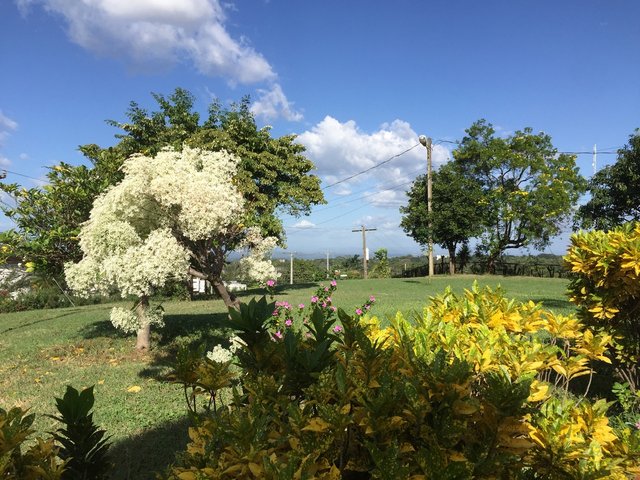
The last four days in Nicaragua have been a ton of fun and a wonderful learning experience. There are few better ways to learn about the world than to get out into it!
@finpunk Goes to Nicaragua (Part 1) started off with a broad macro view of the economy and a little bit of my own past experiences traveling in and out of the country for the last six years. Nicaragua is not an economically free country with limited property rights, and a permission-based bureaucratic economy inhibiting growth. As one entrepreneur I spoke with yesterday said over a cigar:
You're not in a free country. You have to realize that to understand how things work here.
Today we'll take a look at what I've been up to, some developments in the Managua economy, and I'll relate some of the very interesting discussions I've had with local entrepreneurs.
Here's your very own @finpunk and his wife on our way to "The Land of Lakes and Volcanoes:"
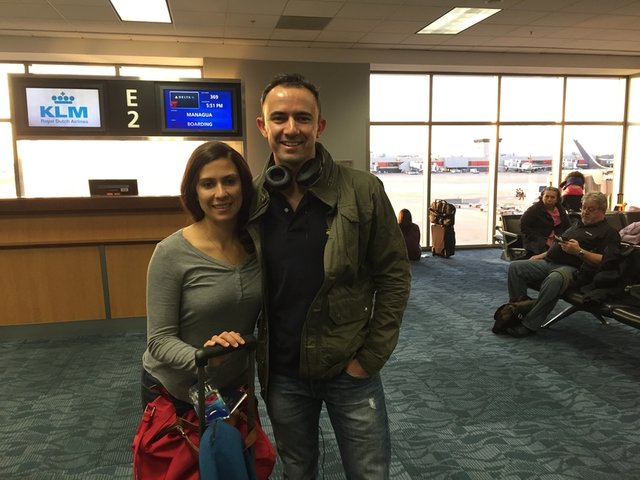
Coming into the country at night you'll notice that it's not quite as well lit as a developed country...kinda to be expected. However, the airport is fairly efficient all around and has a bunch of good eateries and shops. Here's mi esposa waiting for our ride upon arrival:
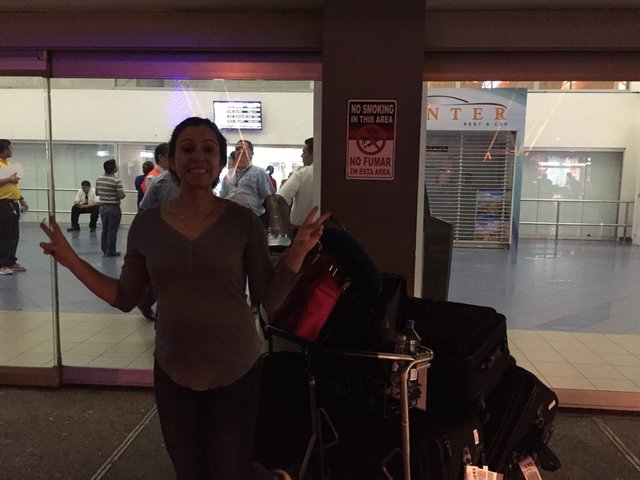
Traffic has exploded in the last few years, which has its issues but is one indication that the middle class is growing and cars are more affordable to a larger cross-section of society.
Traveling is tiring, so our first morning in country was more about relaxing and catching up with family.
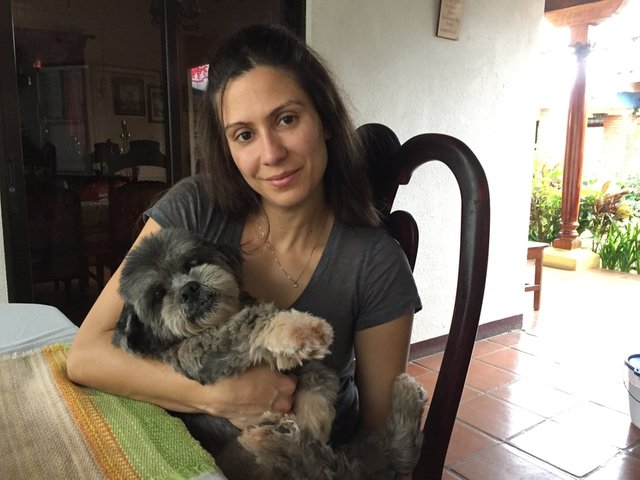
Christmas decorating had already begun...
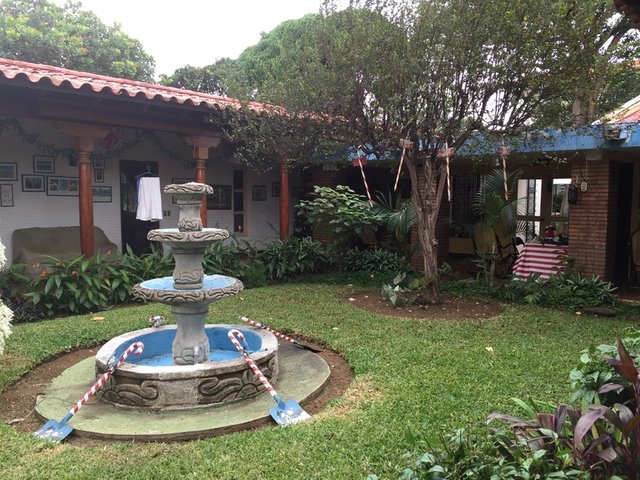
An important thing you learn about in international finance or cross-country economic studies is that trust is a cultural attribute with big impact on overall economic conditions. High trust societies, like Scandinavia, are reliably wealthier than low trust ones like in Somalia...or, in this case, Nicaragua.
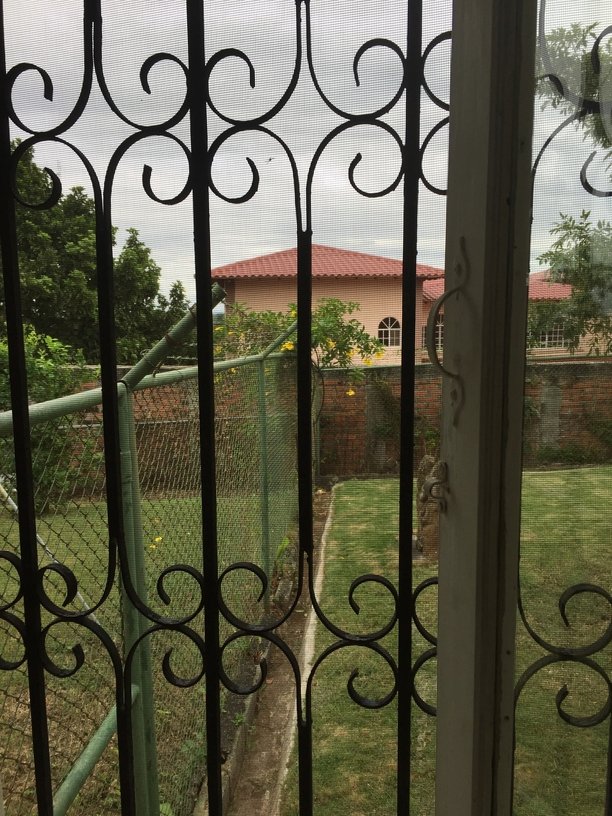
Going anywhere in Nicaragua you'll notice high walls, lots of barbed wire, bars on windows, and plenty of shotgun-wielding security guards. That said, I've consistently heard that Nicaragua is one of the safest countries in Central America.
Without a reliable time-series to really analyze the issue, I'll just venture my own guess and say that revolution, civil war, and Socialism have eroded trust, and it'll take generations of better property rights, rule of law instead of by the discretion of powerful people, and economic growth before the bars and barbed wire fade away.
After settling in, one of the first things I did was head over to my favorite cafe down the block to update some of my cryptocurrency positions and read about venture capital term sheets.

Cafe Las Flores gives any U.S. cafe a run for its money...
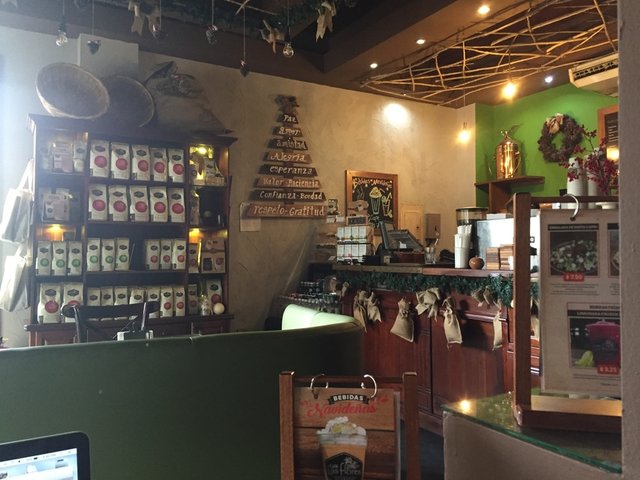
I heart grocery stories in any country, but especially when traveling! What better way to learn about a culture than to understand the food people eat. It's also great for an economist to gauge the health of a society by the quantity and quality of food available.
So here we are--mi esposa y sus padres--hitting up the local supermercado! Note that this is not the typical grocery store in Nicaragua...this is the equivalent of maybe a Whole Foods in terms of price point and target demographic.
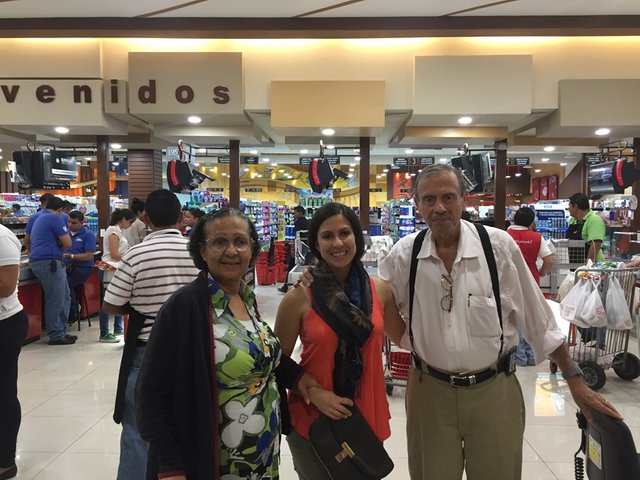
And yes, her papa is a gringo!
Check out this spectacular produce:
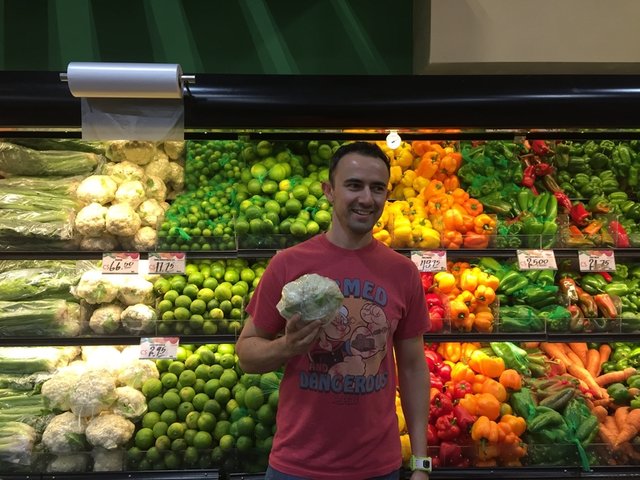
They had my favorite non-alcoholic (expensive) mouthwash:
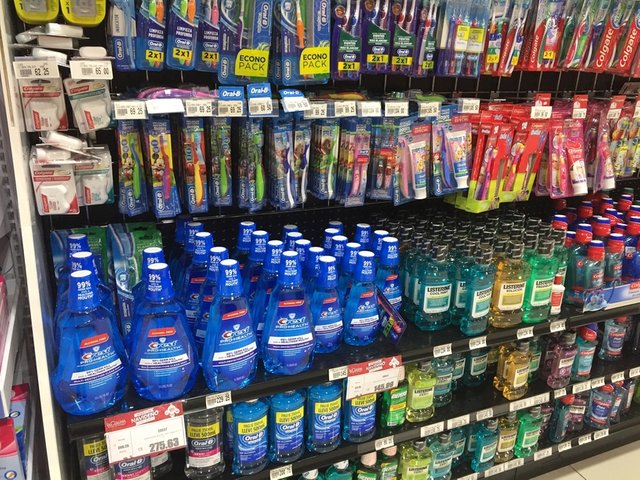
And a better pasta and tomato sauce selection than I remember from the supermercado in Napoli!
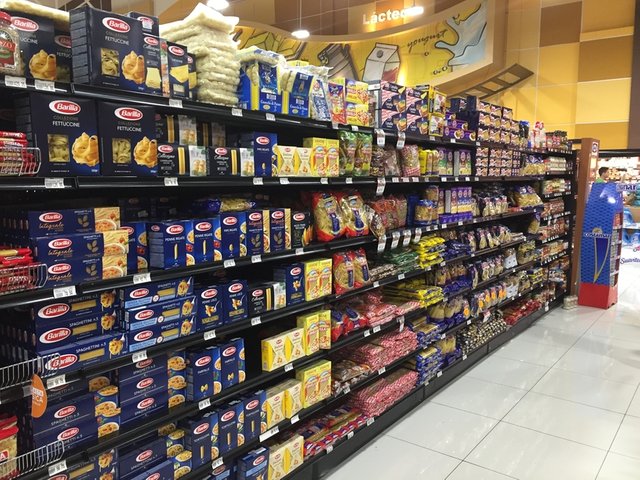
My wife was being an especially good sport that evening and snapped this pic for me with a couple of Santa's helpers informing customers about the local beer brand:

It's a small country and later that night we sat a couple tables away from the ex-presidente at one of my favorite Spanish tapas restaurants, Mesón Español:
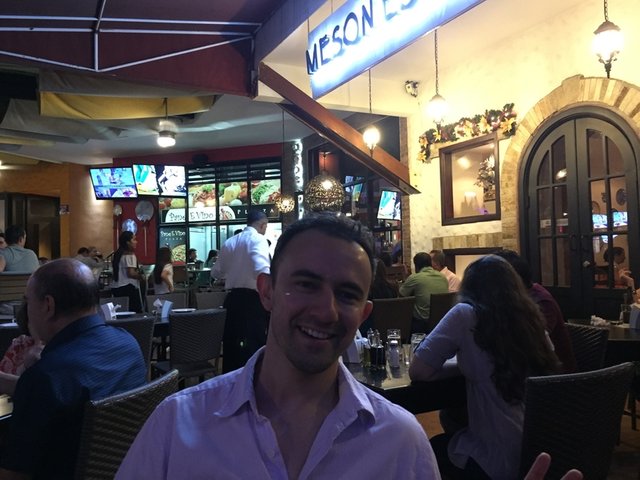
There's a fair amount of construction all over the city, a bullish sign at the moment.
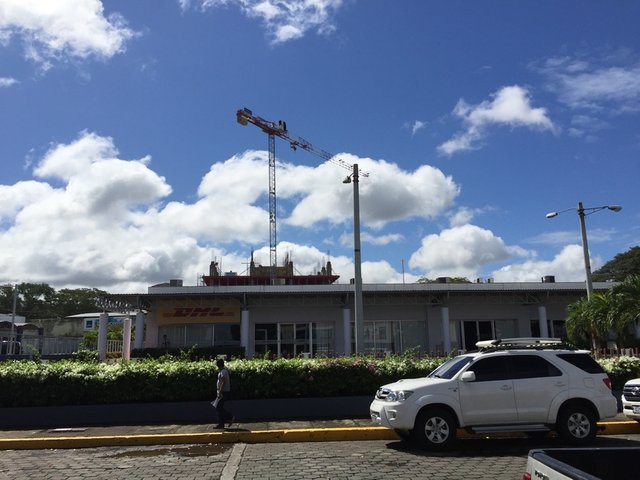
The government spends a good amount of resources marketing its importance to the people. In recent years they've been putting up a lot of these silly metal trees all over Managua that light up different colors at night. It would be hard to argue that people are better off having their money diverted to this stuff, but that's another talk for another time about public goods.
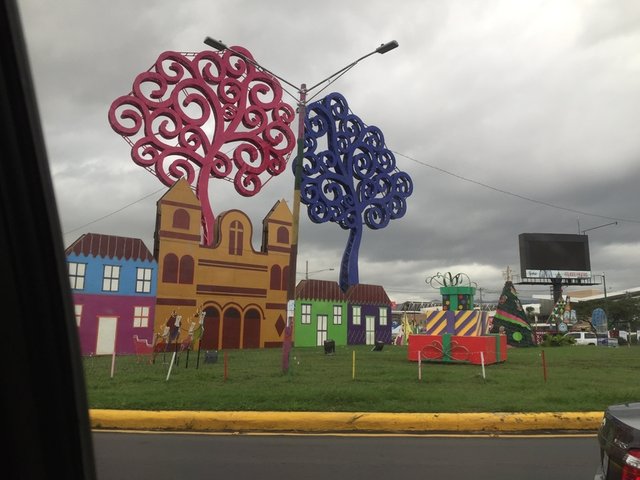
Socialists like to stick together and pump the greatness of the likeminded, hence this tribute to Hugo Chavez...the man who led Venezuela from being one of the most prosperous Latin American countries to chaos. Another great use of funds for an impoverished country...
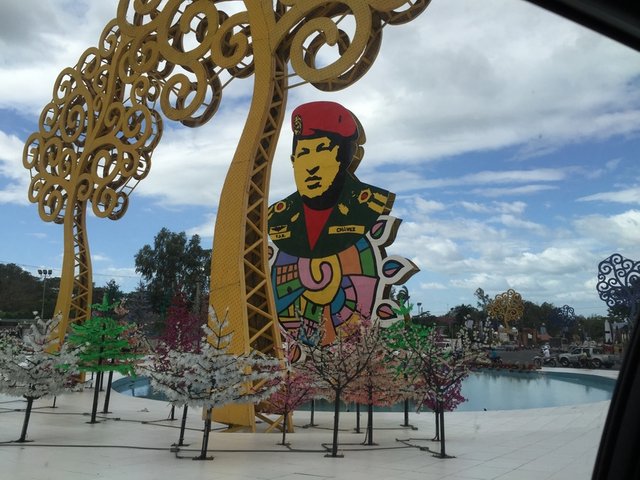
Yet even more prevalent, for obvious reasons, is a mass marketing campaign by the government for the government. Billboards and posters of Daniel Ortega and his Vice President, who happens to be his wife, are everywhere.
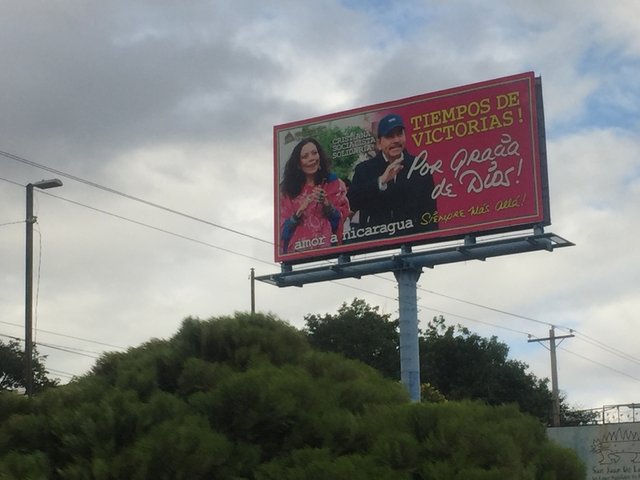
I was told that the Ortegas, being more of a modern type of Socialist, own monopoly rights to import oil and produce electricity for the entire country. Monopolies are nice for their owners, not so nice for customers or entrepreneurs who want to compete.
But some resources definitely go to useful things...
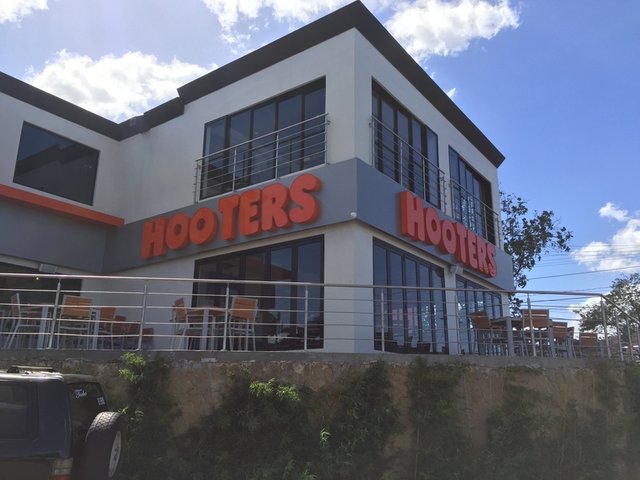
Much of the economy is still old school...
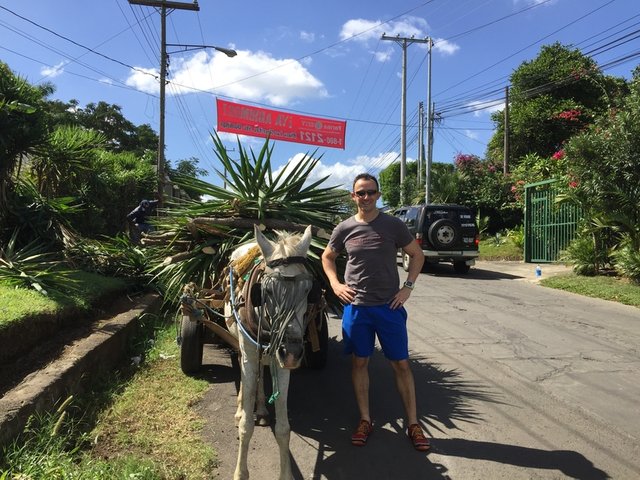
I regret not snapping some pics of my brother-in-law, a new friend (old buddy of his), and I "bringing down the house" at a blackjack table after an incredible lunch at one of the best (and oldest) steakhouses in Managua. We didn't exactly play for high stakes, but the rum was great and we made enough to subsidize lunch and these awesome cigars afterward:
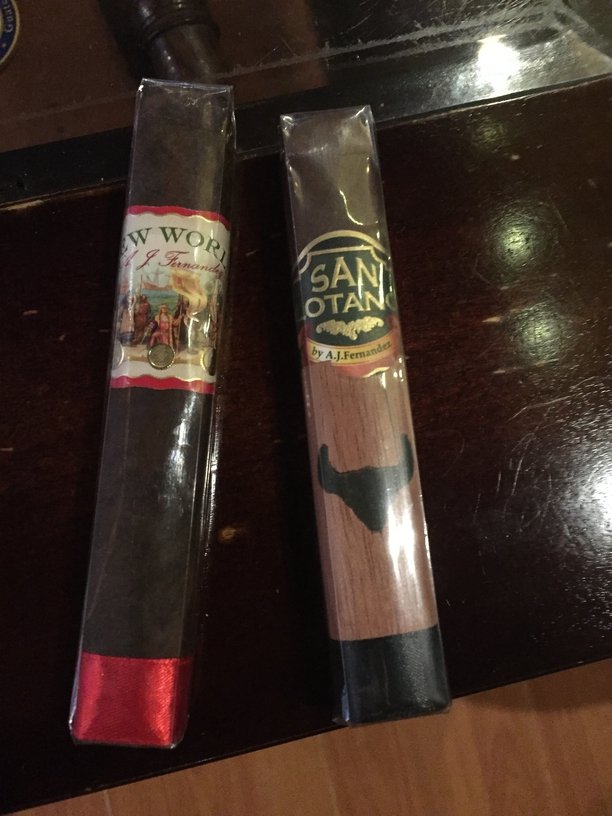
The Nicaraguan cigar seen has come a long way since the civil war, with some of the best brands, like Padron, moving back into the country.
How Most People Get By
@vir asked an excellent question in @finpunk Goes To Nicaragua (Part 1) about how entrepreneurs navigate all the controls and barriers that regulators put in the way of doing business:
I would be interested in how entrepreneurs deal with corruption/government regulation. How hard is it to keep a small business running in Nicaragua?
This came up as a topic over steaks with a successful businessman, and his response was that most people operate in the informal economy and simply ignore all the rules and taxes. An estimated 65.7% of the labor force works in the informal economy.
Large businesses and especially importers are the ones who mostly have to comply with myriad rules, pay taxes, and deal with the government.
Large companies and the rich are in bed with the government, so importing or running a major operation is no problem; they pay to play. If you're a small to medium sized entrepreneur, you're just fucked.
He relayed a story about one of his own experiences that's pretty illustrative. At one point he had a real estate project, part of which was importing bathroom construction items from the U.S. Since Nicaragua has a free trade agreement with the U.S. he didn't think this would be a problem and he wasn't obligated to pay a tariff on the imports.
Well, it turns out that the customs officers thought otherwise and held up the shipment for 3-4 months on grounds that the screws to assemble the items were made in China. This bureaucrat held up the entire shipment and caused a major delay until the entrepreneur wasted money on a lawyer and had a lawsuit ruling release the shipment. All-in-all a major waste of time, resources, and a great example of what's wrong with the Nicaraguan economy.
I hope you've enjoyed this update, and stay tuned for the next article in this series. I'd like to talk about the country's monetary policy and how Bitcoin can play a major role in getting people out of poverty here. Hasta pronto!
What are your thoughts? Let me know if you have any questions about Nicaragua or its economy.
If you like this post, please upvote, resteem, or share below! Please check out my other articles and follow @finpunk to keep in touch with future content.
Rob Viglione is a PhD Candidate in Finance @UofSC with research interests in cryptofinance, asset pricing, and innovation. He is a former physicist, mercenary mathematician, and military officer with experience in satellite radar, space launch vehicles, and combat support intelligence. Currently a Principal at Key Force Consulting, LLC, a start-up consulting group in North Carolina, and Head of U.S. & Canada Ambassadors @BlockPay, Rob holds an MBA in Finance & Marketing and the PMP certification. He is a passionate libertarian who advocates peace, freedom, and respect for individual life.
Great series! Makes me want to visit. I'm glad you addressed my question. I'll have to read through the report you linked.
Thanks! Yeah let me know if you can think of anything else you'd like to know about. I'm trying to score an interview with a government economist here to ask about Bitcoin, but we'll see if that comes through...
I hope that works out. I'm not familiar with Nicaragua, but I am interested in how Bitcoin can be used to circumvent foreign exchange controls.
same here...i think it'd be a situation like this:
https://steemit.com/bitcoin/@finpunk/bitcoin-is-promoting-freedom-in-latin-america
although, the government here might not be as tolerant to a competing money system, but we'll see...it has the potential to really help their people, so it's possible they come down favorably towards Bitcoin and other blockchain projects. i just don't think many people here have heard of them, or at least taken them seriously yet.